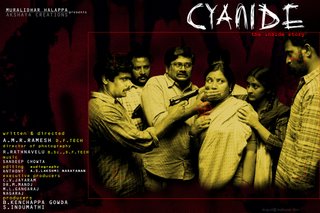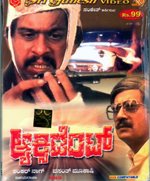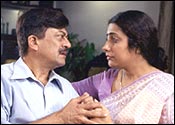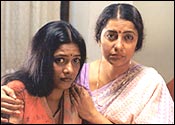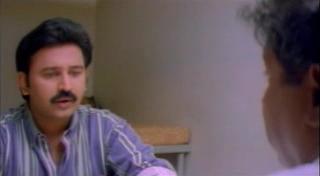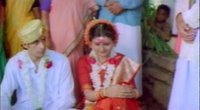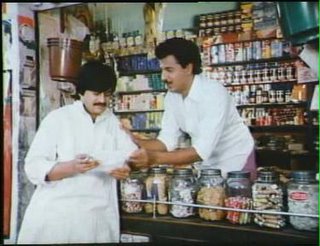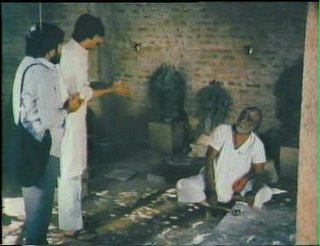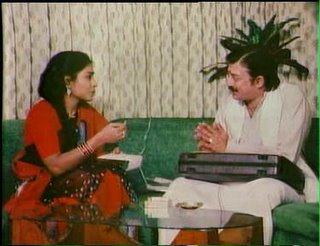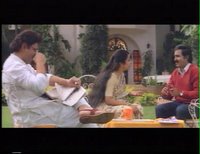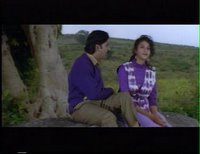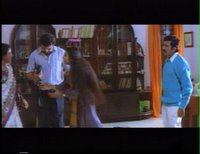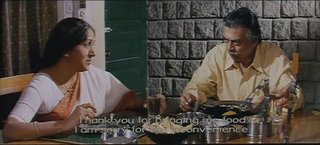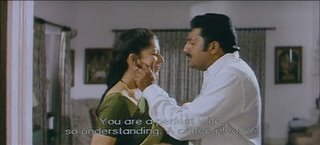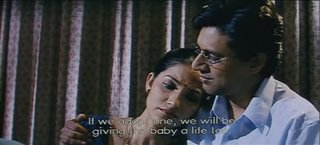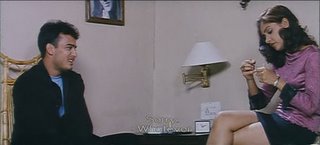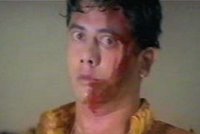Bhoomitaayiya Chochchala Maga (1998)
Featuring: Shivraj Kumar, Ramesh, Shilpa, Vijayalaxmi and others.
Directed by: S.V Rajendra Singh Babu
“The only way to be a true democracy is by taking part in it” is a quote that Bhoomitaayiya Chochchala Maga (BTCM) attempts to examine.
Karna (Shivraj) and Bharat (Ramesh) are close friends. They are such despite their financial status in society (Karna is the rich one). Karna has an annoying namesake girlfriend (Vijayalaxmi in a completely wasted role) who does nothing more than appear in super skimpy outfits and has scenes without a single line of dialog. They are shown to be college going students who are happy winning small time elections and boozing their nights away.
While these three are making merry in the city, Karna’s father Chennabasappa(Sabyasachi) has a heart attack in his hometown Bharatipura. The man needs rest and comfort so Karna shoots across to be by his father’s side. A meaningless confrontation with Neela (Shilpa) who is a social activist and commands extreme goodwill with the local folk there finds Karna apologizing to her for his misbehavior. This act does not gel well with our man and he fumes his frustration on a tennis ball as he narrates this incident to his friend Bharat on his return. Bharat promises Karna that they would together avenge this outrageous act that was meted out against Karna.
Having decided thus, Bharat and Vijayalaxmi arrive in the village posing as some minister’s kids. The village school master is so naïve that he actually invites them into his school without so much as a proper enquiry. Of course, that Bharat is never shown teaching the kids anywhere is apparently irrelevant. All this, however, is an act to get under the skin of the locals there and try to humiliate Neela and claim revenge.
As incidents unfold one after the other, Bharat realizes that getting under Neela’s skin is not an easy task. He also realizes that she has done a lot of commendable works for the village that is dying without water. Farmers commit suicides by consuming insecticides every passing day. Local elections arrive and Bharat wins (he actually stabs himself convinced that it would get him ‘sympathy’ votes!) and soon he is seen taking initiatives in the village for the people’s welfare. Bharat starts looking at his new found responsibility and conveniently forgets all about Karna’s childish revenge-project. Instead, Bharat goes ahead and discovers that the only reason why a dam, which is a great solution to lend water to the dying farmers, was not built from three decades is because of Chennabasappa – Karna’s father. Caught between the greater good to the people and Karna, his close friend, Bharat struggles to keep his ground.
Karna, on the other hand, is busy cutting himself and weeping his eyes out to his girlfriend (who for some reason is still with this man despite his lack of attention towards her.) swearing that he would get back at Bharat for betraying his friendship and trust. They both part ways because of this new friction.
The second half showcases Bharat in the Assembly at the Vidhana Souda presenting his case with Bharatipura’s problems. This is quite possibly
the highlight of the movie in terms of dialogs and presentation. I was impressed by the entire scene which included the typical glimpses from the Parliament where people throws chairs, slippers and words at each other with no one to control the situation. Ramesh delivers his lines with a lot of conviction in this scene and by far this is the only sequence that stood out in the entire movie for me. Truly well shot and deserves applause in all departments.
Unfortunately there is not much applause for this initiative from Bharat from home front. Chennabasappa, as one would imagine, is furious at the progressing harm towards his assets. He did not budge for three decades so one cannot imagine him being any different now. Hence, while Karna is finally basking in the new found light of realization towards his friend, Karna’s father manages to take that same light out of Bharat’s life. Bharat’s murder finally ignites the ray of revolution in Karna as he braces for a showdown with the government, the Chief Minister, his people and his own father.
The one thing that struck me immediately during the first half of the movie is the uncanny resemblance it has to the Hindi feature “Namak Haraam” featuring Amitabh and Rajesh Khanna in similar roles. How a poor friend gets into the rich friend’s environment to try and kill the opposition but ends up becoming their deliverer. The first half is pretty cliché but it is the second half that engrosses you into the goings on. The movie taps on real problems and real situations. But somehow the loud and melodramatic presentation seeps into the reality it tries to showcase thus making its effect weak. Some sequences, like the one with Ramesh mentioned above, are definitely a class apart but once his character dies the remainder of the story loses heat with Shivraj choosing violence to take care of business. It is unfortunate that people have to go to such extreme measures (one good soul actually chops off his own ear without so much as a whisper!) to make a point with the administration.
Rajendra Singh Babu experiments with scene handling in some cases effectively but otherwise it turns out to be a painful exercise. Like most larger than life stories, BTCM leaves many unfinished traces along the way.
Performances wise Ramesh definitely comes out in flying colors, literally, considering his final scenes. He plays the part with a lot of commitment. Shivraj Kumar is alright as the confused and misunderstood rich boy Karan who eventually rebels against the odds. Nothing out of the ordinary from him in this feature. Shilpa is adequate as the tough and goal oriented Neela who has dedicated herself completely for social welfare. Vijayalaxmi is wasted as a little girl trapped inside a grown woman’s body. Others in the story, mostly unknown faces, lend apt support to the goings on which also includes a philosophical “I-am-going-to-build-a-dam-myself” Lokesh who goes around trying to inspire people in vain.
Background score is well composed and gels well with scenes. Songs are nothing to write home about and act as fillers during the story. Editing is well done and camera work of wide angle shots of the rural scene is commendable.
Overall BTCM delivers a strong message. I wish it was not as predictable as it turned out to be towards the end since it was showcasing a real issue that haunts our villages even today. But a valuable bottom line nonetheless.
It is true then that the only way to be a true democracy is by taking part in it.

